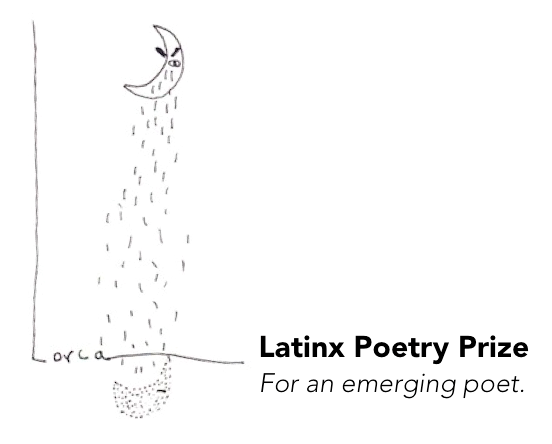The Lorca Latinx Poetry Prize supports the translation and publication of an English-Spanish language, artisanal chapbook by a Latinx poet with no more than one full-length collection in print.
The biannual Prize facilitates various platforms for this emerging poet to present their work—as a way to honor the role of transoceanic friendship in Federico García Lorca’s life and legacy, and to globalize Latinx poetry.
Announcing the 2022 Lorca Latinx Poetry Prize Winner and Honorable Mentions
Carmen Giménez selects ephemeral, by heidi andrea restrepo rhodes
MADRID, SPAIN (October 7, 2022) — The Lorca Latinx Poetry Prize, Letras Latinas, and EcoTheo Collective are thrilled to announce the winner of the 2022 Lorca Latinx Poetry Prize, which supports the publication of an English-Spanish language chapbook by an emerging Latinx poet with no more than one full-length collection in print. The 2022 Prize is awarded to heidi andrea restrepo rhodes for her chapbook ephemeral. Honorable mentions are given to Ayling Zulema Dominguez for Como el Nopal, and Cristian Ramirez Rodriguez for Violet Nerve. The winner and honorable mentions were selected by this year’s guest judge Carmen Giménez and first reader Suzi F. Garcia.
Giménez states: “ephemeral is lush and hypnotic, a greenhouse of exotic unnamed plants, of longing. The language is elemental, physical, wrought, erotic. This poet has a rare sonic gift. I want love to live in all of us this way.”
In its second edition, the Lorca Latinx Poetry Prize offers Spanish translation and bilingual publication of the winning manuscript, and a cash prize of $500 from Letras Latinas. This year, individual poems from both the winner and honorable mentions will be published in the Autumn issue of EcoTheo Review. The winner will also have the chance to read alongside the guest judge at a celebratory offsite event organized by LOGOS, a liturgically-inflected reading series and project of EcoTheo Collective, at AWP 2023 in Seattle, in partnership with Letras Latinas, the literary initiative at Notre Dame's Institute for Latino Studies.
The Lorca Latinx Poetry Prize was conceived to honor the role of transoceanic friendship in poet Federico García Lorca’s life, work, and legacy by bringing emergent Latinx poets and their poetry to larger international audiences. restrepo rhodes is the second winner of the Prize, which was inaugurated in 2019 with poet Steven Sanchez at the Unamuno Authors Festival in Madrid. The Prize continues to facilitate platforms for the winning poet to present their work, including at festivals, residences and readings in the United States, and beyond.
“Lorca’s own articulation of poetic force lives, not only in his poems and letters, but too, in his theory and play of duende, in the submission to a burning aliveness churning in our depths, thrashing against fascism’s death machine and its suffocations of queer desire, of life itself. We evade the grasp of total violence through Duende's “endless baptism of freshly created things.” This is poetry, this is its worldmaking insistence. It gives momentum, ritual, invitation, to the interdependencies we rely on and continue to cultivate, and I am always learning from, opening to, the splendor of saying yes to each other’s queer and neuro-wondrous becomings. The EcoTheo Collective is cultivating this work, and isn’t that a kind of prayer, too—the making sacred of freshly created things? In this context, what does the Lorca Latinx Poetry Prize mean as an initiation of trans-oceanic border-crossing and reaching toward each other, across space and time, in letters and the languaging of our much-needed liberations? Perhaps we might find ourselves in the magnet and magnitude of the horizon, its impermanent and ever-changing light. This chapbook, Ephemeral, is my present offering, my hope to meet you there in the maybe and not-yet. Dear Stranger, I carry you in my heart and hunger, my thrashing, my tomorrow.”
- heidi andrea restrepo rhodes
Winner and Honorable Mentions
-
The 2022 Lorca Latinx Poetry Prize winner heidi andrea restrepo rhodes (ephemeral) is a queer, disabled, Colombian/Latinx, poet, scholar, educator, and cultural worker. Her poetry collection, The Inheritance of Haunting (University of Notre Dame Press, 2019) won the 2018 Letras Latinas Andrés Montoya Poetry Prize. She has received poetry fellowships from CantoMundo, Radar, VONA, and Yale’s Center for the Study of Race, Indigeneity, and Transnational Migration and was a finalist for the 2020 Rona Jaffe Foundation Writers Award. Her poetry has been published in Poetry, Academy of American Poets Poem-a-Day, Split This Rock’s Quarry, Nat.Brut, and Foglifter, among other places. Born in Arizona, and raised in California, she currently lives in Cambridge, MA.
-
Honorable mention Ayling Zulema Dominguez (she/they)(Como el Nopal) is a first-generation Chicana-Dominicana poet, collage artist, mixed media community artist, and youth arts educator from Bronx, NY. Her poetry and public art installations are rooted in radical love, and aimed at affirmation as a step towards liberation. She believes in art that offers protest and nurtures a search for wholeness outside of systems of oppression. Their work dares to ask community members, “Who are we at our most free?” Ayling currently teaches spoken word and visual art classes in public schools across the Bronx and Washington Heights. Select poems of hers have been published in No, Dear Magazine; Moko Magazine; La Galería Magazine; The Protest Review; Latino Rebels; Bronx Free Press; and Alegria Magazine’s Latinx Poetry Anthology.
-
Honorable mention Cristian Ramirez Rodriguez (Violet Nerve) is a 19-year-old unpublished poet currently working towards a Physics degree at Saint Mary's College of California. Inspired by his professor and mentor, Brenda Hillman, he continues to develop his poetic voice. Cristian works across documentary styles of poetry while remaining interested in the lyric tradition. His autochthonous, cross-disciplinary, docu-poetic, and multilingual techniques allow him to convey lived experiences as a Latino-Canadian while contemplating the diverse histories which brought him there.








